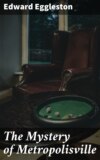Buch lesen: «The Graysons: A Story of Illinois», Seite 13
Lincoln came to town the next week and Bob told him the story, while Lincoln made careful notes of Dave's account of the shooting.
"He says ef Widder Grayson'll let me have a hunderd dollars, un I'll let him play draw poker fer it, he'll light out fer parts onknown."
"Oh! he wants pay, does he?" And the young lawyer sat and thought awhile. Then he turned full on Bob and said:
"Could I depend on you to be in court at the trial without fail, and without my sending a subpœna?"
"Oh, I'll be there un nowheres else," said Bob. "You needn't soopeeny me. I'll come 'thout callin', foller 'thout tollin', un stan' 'thout hitchin'."
"Now if Dave Sovine comes after you for that hundred dollars, you'd better put him off, as easy as you can. If we should buy him off we wouldn't want to give the prosecution time to fetch him back."
Bob thought he saw a twinkle in Lincoln's eye as he said this; a something in his expression that indicated more than he said. But though he looked at the lawyer curiously, he got no further light. That evening, as Bob passed the Grayson farm-house, he told the anxious Barbara something about it, and added: "Abe Lincoln's powerful deep. He's got sumpin ur nuther in 'is head 't I can't noways see into. I don't half believe 't 'e means to buy up that low-lived scoundrel arter all. He acts like a man that's got a deadfall all sot, un is a-tryin' to honey-fugle the varmint to git 'im to come underneath."
And Barbara took what comfort she could out of this assurance.
XXI
HIRAM AND BARBARA
To Barbara, indeed, the unrelieved apprehension and suspense of those long, hot August days were almost intolerable. The frequent excursions to the Moscow jail, to carry some tidbits of home cookery, or some article for Tom's personal comfort, afforded a practical outlet to feeling and a relief from the monotony of passive suffering, but these journeys also brought sharp trials of their own to Barbara's courage and self-control. She might not betray to Tom or to her mother how much she suffered; it was for her to support both the one and the other.
Doubtless it would have been a relief could she have told Hiram Mason all the dreadful apprehensions that haunted her during the long, sleepless nights. But from the hour of Mason's entering the house he had avoided confidential relations with Barbara. Before and after school Hiram attended to all those small cares that about a farm-house usually fall to the lot of a man. Gentle and considerate to Mrs. Grayson and Barbara, he preserved toward the latter a careful reserve. He could not resume the subject discussed the evening they had peeled apples by the loom; it seemed out of the question that he should talk to Barbara of such things while her mind was engrossed with the curse of Cain impending upon her brother. He might have sought to renew the matter under cover of giving her a closer sympathy and a more cordial support in her sorrows, but he saw in her demureness only the same sensitive pride that had shrunk from his advances; and he knew that this pride had been wounded to the quick by the family disgrace. Moreover, to urge his claims as a lover at such a time would cover all his services to the family with a verdigris of self-interest; and he thought that such advances would add to Barbara's distress. In making them he would be taking an unfair advantage of the obligations she might feel herself under to him, and the more he thought of it the more he abhorred to put himself in such an attitude. So he daily strengthened his resolution to be nothing but Mrs. Grayson's next friend while he remained under her roof, and to postpone all the rest until this ordeal should be past.
In many ways he was able to be helpful to the two troubled women. He stood between them and the prying curiosity of strangers, answering all questions about the family, about Tom, and about the case. He was their messenger on many occasions, and he went with them every Saturday or Sunday to Moscow. But at other times Barbara saw little of him except at the table, and he avoided all conspicuous attentions to her. Even Mely McCord, though often at the house, could find no subject for chaff in the relations of the two. When the matter was under discussion among the young gossips at the Timber Creek school-house, Mely declared she "did n' 'low they wuz anything in the talk about the master un Barbary, – he did n' pay Barbary no 'tention 't all, now 't 'e 'd got every chance." If Mason had been a person of less habitual self-repression he would not have been able to house his feelings so securely; but this man came of an austere stock; self-control was with him not merely habitual, it was hereditary.
Hiram had besides a battle of his own to fight. The Monday morning after the killing of Lockwood, as he went to the school-house, he was met in the road by Lysander Butts, next neighbor to the Graysons – a square-built man with a cannon-ball head. Butts was from the hill country of New Jersey, a man of narrow prejudices and great obstinacy.
"Looky here, Mr. Mason," he said, "d' you think now that a schoolmaster ought to take up for a rascal like Tom Grayson, that's a gambler, and I don't know what, and that's killed another fellow, like a sneak, in the dark?"
"I have n't taken up for Tom any more than to want him to have fair play," said Mason. "But I thought that the poor old lady needed somebody to be her friend, and so I went there, and am going to do what I can for her."
"Well, I know the Graysons mighty well, first and last, this many a ye'r, and they're all cut off of the same piece; and none of them is to be overly trusted, now you mind that."
"You have a right to your opinion," said Hiram; "but I am Mrs. Grayson's friend, and that is my lookout."
"Mrs. Grayson's friend?" said Butts, with a sneer. "Mrs. Grayson, ainh? As if you could make me believe it was the mother you're defending. It's Barbary you're after."
Mason colored as though accused of a crime. Then, recovering himself, he said: "It's very impudent of you to be meddling, Mr. Butts. So long as I behave myself, it's none of your business." And he went on toward the school.
"None of my business, ainh? You'll find out whose business it is mighty shortly," Butts called after Hiram.
The quarrel between the Buttses and the Graysons dated back to their first settlement in Illinois. Butts had regularly cut wild hay on the low-lying meadow between the two farms. Fond of getting something for nothing, he gave out among his neighbors that this forty acres was his own, but he put off entering it at the Land Office. When Tom Grayson's father entered his farm he found this piece blank and paid for it. From that time Butts had been his enemy, for there was no adjunct to a farm in the timber so highly prized as a bit of meadow. When once near neighbors in the country have quarreled their proximity is usually a guarantee that they will never be reconciled; – there are so many occasions of offense between people who must always be eating off the same plate. It was universally known that "the Buttses and the Graysons couldn't hitch." Where two of their fields joined without an intervening road they had not been able even to build a line fence together; but each man laid up a rail fence on the very edge of his own land, and the salient angles of the two hostile fences stood so near together that a half-grown pig could not have passed between. This is what is called, in the phrase of the country, a "devil's lane," because it is a monument of bad neighborhood.
When Mason reached the school-house that morning Angeline Butts had her books and those of her younger brother and two younger sisters gathered in a heap, and the rest of the scholars were standing about her, while she did her best to propagate the family antagonism to the master. The jealousy of Lysander Butts's family had been much inflamed by Barbara's swift success in study. Angeline had never been able to get beyond the simple rules of arithmetic; her feeble bark had quite gone ashore on the sandy reaches of long division. The Buttses were therefore not pleased to have Barbara arrive at the great goal of the Rule of Three, and even become the marvel of the neighborhood by passing into the mysterious realm of algebraic symbols. For Angeline's part she "couldn't see no kind-uv good, noways you could fix it, in cipherin' with such saw-bucks." Figgers was good enough for common folks, she said, and all this gimcrack work with x's and y's was only just a trick to ketch the master. For her part she wouldn' fool away time settin' her cap for sech as him, not if he was the only man in the world.
When Tom was arrested for murder, the Buttses felt that their day had come. Folks would find out what sort of people the Graysons were now; and what would become of all Barbary's fine match with the master? Hey? But when, on the very day after the shooting, Angeline came home bursting with indignation, that the master'd gone and took up his board and lodging at the Graysons', and had put John Buchanan into his place for a day and gone off down to the jail with the Graysons, their exasperation knew no bounds. Butts rose to the occasion, and resolved to take his children out of the school. No man that countenanced murder could teach Butts's children. It is the inalienable right of the free-born American citizen to relieve his indignation by taking his children from school, and by stopping his newspaper.
When Mason entered the school-room after his encounter with the father he was not surprised to find the whole battalion of Butts infantry drawn up in martial array, while Angeline held forth to the assembled pupils on the subject of the master's guilt in countenancing Tom Grayson, and the general meanness of the whole Grayson "click," living and dead. When the auditors saw Hiram come in they fell away to their seats; but Angeline, pleased to show her defiance of the master, who could no longer punish her, stood bolt upright with her bonnet on until the school had been called to order. The younger Buttses sat down from habitual respect for authority, and the brother pulled off his hat; but Angeline jammed it on his head again, and pulled him to his feet. She might have left before the school began; but she preferred to have a row, if possible. So when the school had grown quiet, she boldly advanced to the space in front of the master's desk, with the younger and more timid Buttses slinking behind her.
"Mr. Mason, father's goin' to take me out of school," she said.
"So he told me."
"He wants us to come right straight home this morning."
"Well, you know the road, don't you?" said Hiram, smiling. "If he's in a hurry for you, I should have thought you might have been there by this time."
This reply set the school into an audible smile. Angeline grew red in the face, but the master was standing in silence waiting for her to get out, and the scholars were laughing at her. There was nothing more to be said, and nothing for it but to be gone or burst. In her irritation she seized her youngest sister, who was shamefacedly sneaking into Angeline's skirts, and gave her a sharp jerk, which only added a fresh impulse to the titter of the scholars, and Angeline and her followers were forced to scuffle out of the door in confusion.
Lysander Butts was not a man to give over a struggle. Conflict was his recreation, and he thought he could "spite the master" not only by refusing payment for the tuition his children had already received, but by getting the Timber Creek district to shut Mason out of their school-house. There were those in the district who resented Mason's friendship for the Graysons, but they were not ready to go so far as Butts proposed. And in asking Buchanan to teach school for him a single day Mason had unwittingly made friends against the time of trouble; for the old schoolmaster now took the young man's part, and brought over to his side the three Scotch families in the district, who always acted in unison, as a sort of clan. Butts was at a serious disadvantage in that he lived beyond the limits of the Timber Creek district. "What does he want to come a-maiddlin' wi'us fer?" Buchanan demanded of the Timber Creekers. "Let 'im attaind to the beesness of his own deestrict, and not go to runnin' his wee crookit daivils' lanes doun here." Such arguments, with the help of Mason's good-nature, his popularity with the pupils, and his inflexible determination to keep his own gait, caused the opposition to weaken and die out gradually without doing serious damage to the school.
To this favorable issue the friendly influence of the Albaugh family, who were outside of the district on the other side from Butts, contributed something. With Rachel Albaugh Mason became better acquainted through her interest in Tom's fate. She sought a conversation with the master almost every day to gain information about the case. The placidity of her face was not ruffled by solicitude, the glory of her eyes was not dimmed by tears. But interest in Tom's fate there surely was. It did not greatly matter to her whether Tom had committed the deed or not: in any case he was a bold and daring fellow who had lifted himself out of the commonplace, and who was proportionately interesting to Rachel's imagination.
But the people generally did not see things through the eyes of a romantic young woman. They were for the most part dead against Tom, and the adverse tide set more and more strongly against him when the long August days had worn themselves away and September with its bursts of storm had come in. If Tom had shot Lockwood in a street affray there would have been a disposition to condone the offense, seeing there was "a girl in the case," a circumstance that goes for much in the minds of pioneer people; for girls and horses are two things accounted well worth fighting for in a new country. Some philosophers explain this by saying that both the one and the other are means of ascent in the scale of civilization. But the fact is, that new-country people set much more store by their horses and their sweethearts than they do by civilization, for which, in the abstract, they care but little. They also esteem courage very highly. But to shoot a man in the dark as Lockwood had been shot was cowardly, and cowardice was in itself almost ground enough for hanging a man.
This increased momentum in the popular feeling against Tom could not escape the knowledge of Mason, to whom people talked with some freedom, but he managed to conceal it from Barbara and Mrs. Grayson. His situation indeed was becoming more and more difficult. He foresaw that the maintenance of his present attitude toward Barbara might soon become impossible. To be always near to her, and yet to keep himself so aloof, was more than even his nature would bear. Above all, to see her consumed by sorrow and to be afraid to speak the tenderest word of sympathy was torment. The very aspect of her suffering face set his nerves in a tremor; it became difficult for him to say good-morning to her with composure. There is the uncontrollable in all of us; and self-contained as Hiram was, he came upon the uncontrollable in himself at last.
He had reached the closing days of his school term, though it yet lacked a fortnight of the September "court week" at Moscow. It was his purpose to remain and see the Graysons through their trouble: what would become of his own trouble, when Tom's fate should have been settled one way or the other, he could not foretell. And he was, moreover, filled with the worst forebodings in regard to the issue of the trial. He came home from school a little earlier than usual on the last day but one of his school session, and fearing to trust himself too much in Barbara's presence, he had gone past the house directly to the barn, to do those night and morning things which are classed as chores or "choores," according to the accent of the region in which you chance to hear the word. On entering the barn he was surprised to find Barbara sitting on the "draw-horse" or shaving-bench. She had fled to the threshing-floor, with the belief that she was seeking for eggs, but really to find relief in tears that she could not shed in the house without opening the great deep of her mother's sorrows. She had remained longer than she intended, weeping heartily, with no witness but the chattering swallows in the rafters above, and old Blaze-face, who looked placidly at her from behind the bars of his hay-rack.
The sight of Barbara alone in the dusky light of the threshing-floor awakened in Hiram an inexpressible longing to tell her of all there was in his heart; the vision of Barbara in tears was too much for his resolution. He went forward and sat down by her; he involuntarily put his right arm about her shoulders, and drew her to him in a gentle embrace; he took her handkerchief in his left hand and wiped the tears from her cheeks and said softly:
"Dear Barbara, now don't cry any more; I'm so sorry for you."
Barbara sat still; whether displeased or not Hiram could not tell, for she did not say a word. She neither accepted nor refused his embrace. Hiram felt a powerful impulse to say more, but he suddenly remembered that Barbara's grief had no relation to him, and it seemed hateful that he should intrude his own feelings and hopes upon her in her all-engrossing sorrow, and he feared to offend again a pride so sensitive as he knew hers to be. But he allowed himself once more to draw the silent Barbara toward him with a gentle pressure; then, with a resolute effort at self-control, he climbed into the mow to pitch down some hay for old Blaze. This duty he performed as quickly as possible, blindly intent on returning to Barbara once more. But when he came down again Barbara had gone, and he sat down on the draw-horse where she had been, and remained there long, all alone but for the swallows flitting in and out through the openings between the lower ends of the rafters, and gossiping from one mud-built nest to another. In this time he asked himself questions about his conduct in the difficult days yet to come, and tried to reproach himself for the partial surrender he had made to his feelings; though now he had given so much expression to his affection, he could not for the life of him repent of it.
If he had known how much strength this little outbreak of sympathy on his part had given to Barbara, his conscience would have been quite at ease. Even Mrs. Grayson was sustained by the girl's accession of courage. In the darkest days that followed, Barbara liked to recall Hiram's voice soothing her, and begging her not to weep; and with blushes she remembered the pressure of his gentle embrace about her shoulders. This memory was a check to the bitterness of her grief. But Hiram had lost confidence in himself. There were yet two more weeks to be passed, and unless he should desert Barbara in her trouble, he would have to spend these weeks in unceasing conflict.
The next day was the last of the school-term, and according to immemorial usage, the last Friday afternoon of a school-term was spent in a grand spelling-match, in which others than the regular pupils of the school were free to engage. It was while this orthographical scrimmage was going on that the county clerk, Magill, sprucely dressed, and ruddy-faced as ever, rode up to the school-house. He spent many of his days in riding about the county, palavering the farmers and flattering their wives and daughters, and, by his genial Irish manners, making friends against the time of need. Who could tell whether it might not also be worth while to make friends with the grown-up and growing-up pupils of the Timber Creek school; there would be elections after these boys came to vote. Besides, he remembered that Rachel Albaugh was one of Mason's postgraduate scholars, and it was not in such a connoisseur of fine women to miss an opportunity of seeing the finest in the county. So he went in and sat for an hour on the hard bench with his back against the stone jamb of the great empty fire-place, and smilingly listened to the scholars wrestling with the supreme difficulties of Webster's Elementary; such, for example, as "incomprehensibility," and other "words of eight syllables accented on the sixth." By the time the spelling-match was over and the school was ready to be dismissed he had evolved a new plan relating to his own affairs. In making friends and electioneering no one could excel Magill; but for attending to the proper work of his office he had neither liking nor aptitude, and the youth he kept there, though good enough at building fires and collecting fees, was not competent to transcribe a document. The records were behind, and he needed some one to write them up. He was too prudent to take into the office any man who in after years could use the experience that might be gained and the knowledge of his own dilatory habits that might be acquired there to supplant him. It occurred to him now that it would be a good stroke to engage Mason, who was not likely ever to be a resident of the county, and who could therefore never become a rival.
While these thoughts were in Magill's mind, Hiram was indulging in a few words of that sort of sentiment to which schoolmasters are prone when the parting time comes. When the children were dismissed they formed themselves into two rows on the outside of the school-house door, according to an antique and, no doubt, Old-World custom still lingering in some rural places at that time. When the master made his exit the boys were on his right and the girls were on his left, – probably because of Eve's indiscretion in the garden of Eden. Between the two rows Hiram marched slowly, with a quizzical look on his face, as the boys, to the best of their knowledge and ability, bowed to him, and the girls, with an attempt at simultaneousness, dropped "curcheys" of respect. Magill stood in the door and smiled to see some of the boys bend themselves to stiff right angles on their middle hinges, while others grinned foolishly and bobbed their heads forward or sidewise, according to the string they chanced to pull. The performances of the other row were equally various; some of the girls bent their knees and recovered themselves all in one little jerk, while others dropped so low as to "make tubs" of their dress-skirts. When these last honors had been paid, the scholars broke ranks and started for their homes.
As Magill put one foot into the stirrup he said: "Mason, how would yeh like to come down to Moscow an' help me write up me books? I'm a good dale behoind; an' ef you like to come for a wake or two an' help me to ketch up, I'll give yeh four bits a day an' yer board at the tavern."
Hiram's finances were so straitened that this offer of fifty cents a day was very welcome to him. How could he serve the Graysons better than to be where he could see Tom every day, and look after his interest in any contingency that might arise? This and the recollection of his embarrassing situation in the Grayson household quickly decided him; and as the condition of Magill's office was distressing, he promised to come to town in time to begin by 9 o'clock the next morning.
That evening he explained the matter to Barbara and her mother at the supper table; and before bed-time he had arranged with Bob McCord to look after the "critters," as Bob called them. The next morning Hiram was off by daybreak. Bob McCord took him half-way with old Blaze, – for the rest, he "rode shank's mare," as the people say, – and by 9 o'clock he was trying to thread the labyrinth of confusion in Magill's office.
To Barbara it seemed the greatest good fortune to have Mason near to Tom, but the table was intolerably lonely when only two sorrow-smitten women sat down together.















